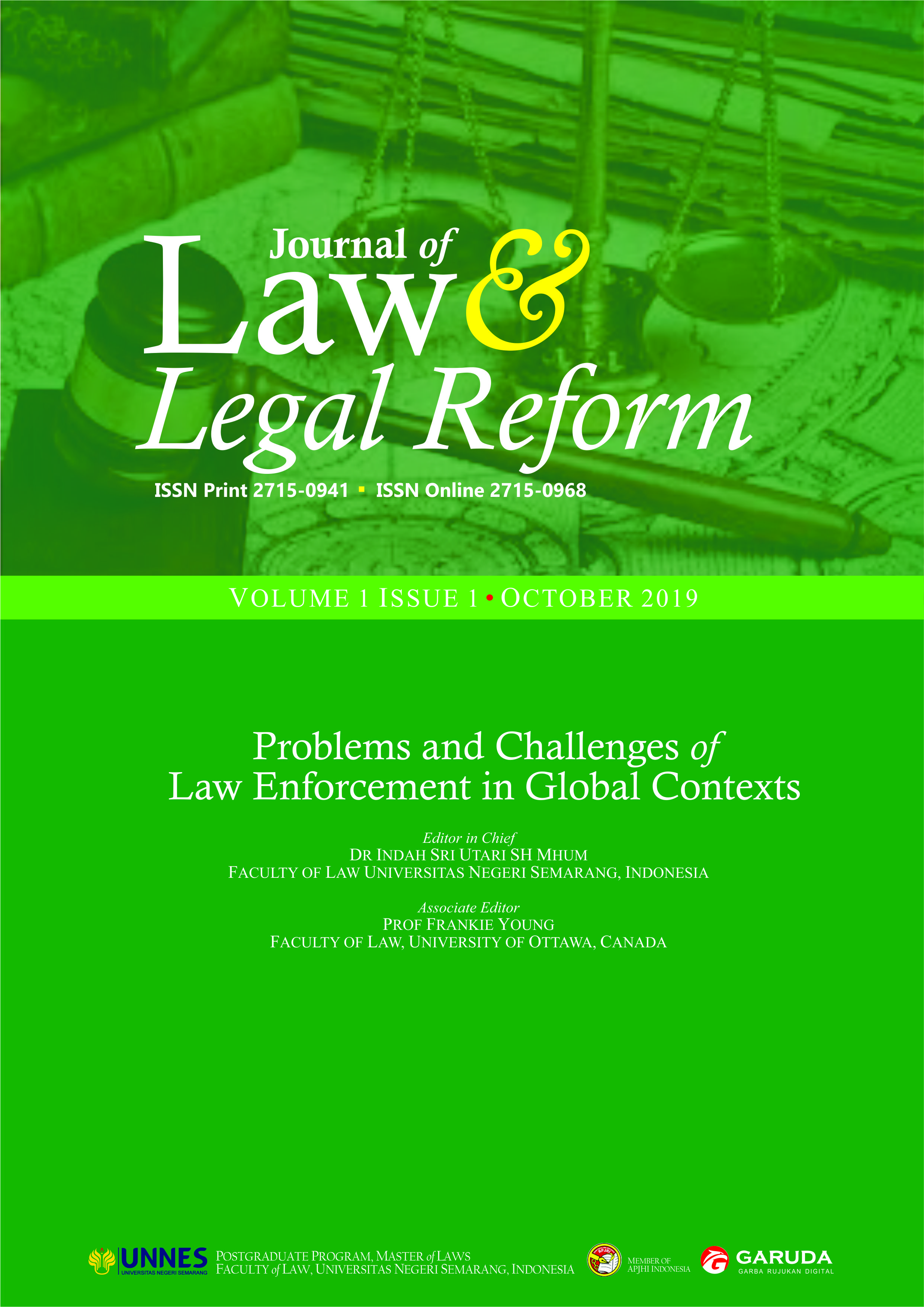The Meaning of the Expansion of Administrative Court that Covers Factual Actions
Main Article Content
Abstract
The Administrative Court and Law No. 5 of 1986 on State Administrative Justice have been provided facilities for the public to sue the government and ask to cancel the decision made by the government. Law No. 30 of 2014 on Government Administration has been stipulated that Government Administration Act more or less supersedes the provisions contained in the Law of the State administrative justice. Especially in this Law which attracts attention is the expansion of object disputes state Administration. The object of the state Administration dispute in this Act is different from its elements to the Law of the State administrative justice. One of these is a written stipulation that includes factual action. There is no explanation for the meaning of factual acts in this Administrative Administration Act. Therefore, further research is needed in this regard. This study aims to find out and understand the meaning of factual actions in Article 87 letter (a) of Law Number 30 of 2014. This study uses a qualitative approach to the type of research Normative Juridical. Data collection techniques are Library study is to collect data conducted by reading, quoting, recording and understanding various literature that have to do with research material. The object of the state Administration disputed in Law Number 5 of 1986 and its amendment has expanded on Law Number 30 Year 2014 on Government Administration. When the object of the dispute expands, it will affect the decision taken by the legal practitioner in this case is the state Administration judge.
Article Details
All writings published in this journal are personal views of the authors and do not represent the views of this journal and the author's affiliated institutions. Author(s) retain copyrights under a Creative Commons Attribution-NonCommercial-ShareAlike 4.0 International (CC BY-NC-SA 4.0).
References
Abdullah, R. (1992). Hukum Acara Peradilan Tata Usaha Negara. Jakarta: Rajawali Pers.
Adji, O.S. (1980). Peradilan Bebas Negara Hukum. Jakarta: Penerbit Erlangga.
Asshiddiqie, J. (2008). Pokok-Pokok Hukum Tata Negara Indonesia Pasca Refsormasi. Jakarta: PT. BhuanaIlmu Populer, Kelompok Gramedia.
Atmosudirdjo, P. (1983). Hukum Administrasi Negara. Jakarta: Ghalia Indonesia.
Effendi, L. (2003). Pokok-Pokok Hukum Administrasi Negara. Malang: Bayumedia Publishing.
Hadjon, P.M. (1993). Pemerintahan Menurut Hukum (WET-EN RECHMATIG BESTUUR). Surabaya: Yuridika.
Indroharto, I. (1993). Usaha Memahami Undang-undang tentang Peradilan Tata Usaha Negara. Jakarta: Pustaka Harapan.
Kusnardi, M., & Ibrahim, H. (1983). Pengantar Hukum Tata Negara Indonesia. Jakarta: Pusat Studi Hukum Tata Negara Fakultas Hukum Universitas Indonesia.
Lopa, B., & Hamzah, A. (1992). Mengenal Pradilan Tata Usaha Negara. Jakarta: Sinar Grafika.
Mertokusumo, S. (2014). Perbuatan Melawan Hukum Oleh Pemerintah. Yogyakarta: Cahaya Atma Pustaka.
Miles, M.B., & Huberman, M. (1992). Analisis Data Kualitatif Buku Sumber Tentang Metode-metode Baru. Jakarta: UI Press.
Moleong, L. J. (2007). Metodologi Penelitian Kualitatif. Bandung: Remaja Rosdakarya.
Muhammad, A. (2004). Hukum dan Penelitian Hukum. Bandung: PT. Citra Aditya Bakti.
Ridwan HR. (2014). Hukum Administrasi Negara. Jakarta: PT Raja Grafindo Persada.
Sadjijono, S. (2011). Bab-Bab Pokok Hukum Administrasi. Yogyakarta: Laksbang Pressindo.
Siahaan, L.O. (2005). Prospek PTUN sebagai Pranata Penyelesaian Sengketa Administrasi di Indonesia, Studi Tentang Keberadaan PTUN Selama Satu Dasawarsa 1991-1981. Jakarta: Perum Percetakan Negara RI.
Surianingrat, B. (1992). Mengenal Ilmu Pemerintahan. Jakarta: PT Rineka Cipta.
Utrech, E. (1960). Pengantar Hukum Administrasi Negara Indonesia . Jakarta: Ikhtiar.
Amir, J. (2009). Acta Tropica Using the courts to challenge irrational health research policies and administrative decisions. 76–79. https://doi.org/10.1016/j.actatropica.2009.07.035
Bogdanova, E. (2018). Obtaining redress for abuse of office in Russia: The Soviet legacy and the long road to administrative justice. Communist and Post-Communist Studies, 51(3), 273–284. https://doi.org/10.1016/j.postcomstud.2018.07.002
Cook, J. (1981). Evaluating the Administrative Efficiency of Courts. 10.
Ierro, A. E. F. (2015). A Comparative-Empirical Analysis Of Administrative Courts In Mexico. Sergio L. 3–35. https://doi.org/10.1016/S1870-0578(16)30001-4
Pelivanova, N., & Dimeski, B. (2011). Efficiency of the Judicial System in Protecting Citizens against Administrative Judicial Acts: The Case of Macedonia. International Journal For Court Administration ISSN 2156-7964
Prahastapa, A.M.R., et.al. (2017). Friksi Kewenangan PTUN dalam Berlakunya Undang-undang Nomor 30 Tahun 2014 dan Undang-Undang Nomor 5 Tahun 1986 Berkaitan dengan Objek Sengketa Tata Usaha Negara (TUN). Semarang: Fakultas Hukum Universitas Diponegoro.
Simanjuntak, E. (2014). Beberapa Anotasi Terhadap Pergeseran Kompetensi Absolut Peradilan Umum Kepada Peradilan Administrasi Pasca Pengesahan UU No 30 Tahun 2014. Bunga Rampai Peraddilan Adminsitrasi Kontemporer. Yogyakarta: Genta Press.
Susilo, A.B. (2013). Reformulasi Perbuatan Melanggar Hukum oleh Badan atau Pejabat Pemerintahan dalam Konteks Kompetensi Absolut Peradilan Tata Usaha Negara. Jurnal Hukum dan Peradilan, 10(2), 291-308
Zhou, W., Peng, Y., & Bao, H. (2017). Regular pattern of judicial decision on land acquisition and resettlement: An investigation on Zhejiang’s 901 administrative litigation cases. Habitat International, 63, 79–88. https://doi.org/10.1016/j.habitatint.2017.03.013
Republic of Indonesia. (2014). Naskah Akademik Rancangan Undang-Undang Nomor 30 Tahun 2014 tentang Administrasi pemerintahan.
Republic of Indonesia. (1986). Undang-Undang Nomor 5 Tahun 1986 tentang Peradilan Tata Usaha Negara.
Republic of Indonesia (2009). Undang-Undang Nomor 51 Tahun 2009 tentang Perubahan Kedua atas Undang-Undang Nomor 5 Tahun 1986 tentang Peradilan Tata Usaha Negara.
Republic of Indonesia (2014). Undang-Undang Nomor 30 Tahun 2014 tentang Administrasi Pemerintah
